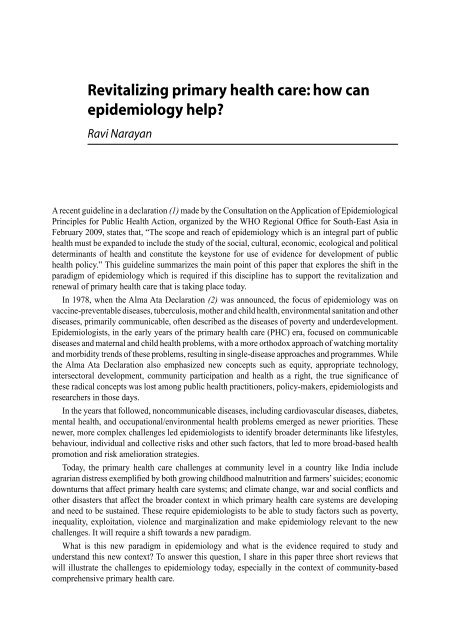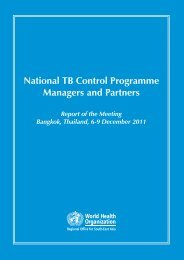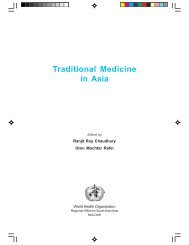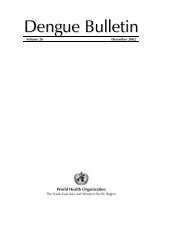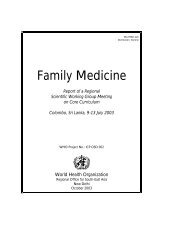South-East Asia Regional Conference on Epidemiology
South-East Asia Regional Conference on Epidemiology
South-East Asia Regional Conference on Epidemiology
You also want an ePaper? Increase the reach of your titles
YUMPU automatically turns print PDFs into web optimized ePapers that Google loves.
Revitalizing primary health care: how can<br />
epidemiology help?<br />
Ravi Narayan<br />
A recent guideline in a declarati<strong>on</strong> (1) made by the C<strong>on</strong>sultati<strong>on</strong> <strong>on</strong> the Applicati<strong>on</strong> of Epidemiological<br />
Principles for Public Health Acti<strong>on</strong>, organized by the WHO <str<strong>on</strong>g>Regi<strong>on</strong>al</str<strong>on</strong>g> Office for <str<strong>on</strong>g>South</str<strong>on</strong>g>-<str<strong>on</strong>g>East</str<strong>on</strong>g> <str<strong>on</strong>g>Asia</str<strong>on</strong>g> in<br />
February 2009, states that, “The scope and reach of epidemiology which is an integral part of public<br />
health must be expanded to include the study of the social, cultural, ec<strong>on</strong>omic, ecological and political<br />
determinants of health and c<strong>on</strong>stitute the keyst<strong>on</strong>e for use of evidence for development of public<br />
health policy.” This guideline summarizes the main point of this paper that explores the shift in the<br />
paradigm of epidemiology which is required if this discipline has to support the revitalizati<strong>on</strong> and<br />
renewal of primary health care that is taking place today.<br />
In 1978, when the Alma Ata Declarati<strong>on</strong> (2) was announced, the focus of epidemiology was <strong>on</strong><br />
vaccine-preventable diseases, tuberculosis, mother and child health, envir<strong>on</strong>mental sanitati<strong>on</strong> and other<br />
diseases, primarily communicable, often described as the diseases of poverty and underdevelopment.<br />
Epidemiologists, in the early years of the primary health care (PHC) era, focused <strong>on</strong> communicable<br />
diseases and maternal and child health problems, with a more orthodox approach of watching mortality<br />
and morbidity trends of these problems, resulting in single-disease approaches and programmes. While<br />
the Alma Ata Declarati<strong>on</strong> also emphasized new c<strong>on</strong>cepts such as equity, appropriate technology,<br />
intersectoral development, community participati<strong>on</strong> and health as a right, the true significance of<br />
these radical c<strong>on</strong>cepts was lost am<strong>on</strong>g public health practiti<strong>on</strong>ers, policy-makers, epidemiologists and<br />
researchers in those days.<br />
In the years that followed, n<strong>on</strong>communicable diseases, including cardiovascular diseases, diabetes,<br />
mental health, and occupati<strong>on</strong>al/envir<strong>on</strong>mental health problems emerged as newer priorities. These<br />
newer, more complex challenges led epidemiologists to identify broader determinants like lifestyles,<br />
behaviour, individual and collective risks and other such factors, that led to more broad-based health<br />
promoti<strong>on</strong> and risk ameliorati<strong>on</strong> strategies.<br />
Today, the primary health care challenges at community level in a country like India include<br />
agrarian distress exemplified by both growing childhood malnutriti<strong>on</strong> and farmers’ suicides; ec<strong>on</strong>omic<br />
downturns that affect primary health care systems; and climate change, war and social c<strong>on</strong>flicts and<br />
other disasters that affect the broader c<strong>on</strong>text in which primary health care systems are developing<br />
and need to be sustained. These require epidemiologists to be able to study factors such as poverty,<br />
inequality, exploitati<strong>on</strong>, violence and marginalizati<strong>on</strong> and make epidemiology relevant to the new<br />
challenges. It will require a shift towards a new paradigm.<br />
What is this new paradigm in epidemiology and what is the evidence required to study and<br />
understand this new c<strong>on</strong>text? To answer this questi<strong>on</strong>, I share in this paper three short reviews that<br />
will illustrate the challenges to epidemiology today, especially in the c<strong>on</strong>text of community-based<br />
comprehensive primary health care.


